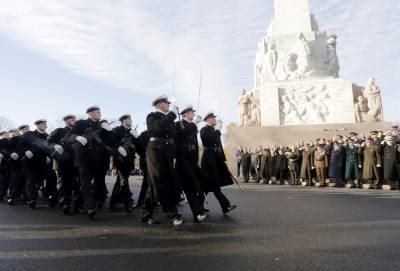The National Security Council of Latvia (NSC) is charged with correlating and unifying national policies determined by the state’s highest-ranking government authorities and officials in the area of national security, with overseeing the implementation of those policies and problems related to the same, with reviewing plans and conceptual documents that are related to national security, and with handling other issues as defined by law.
Currently, the NSC operates by the National Security Law, the Law on National Security Authorities, and other laws of the Republic of Latvia.
The President of Latvia chairs the NSC, who summons the meetings thereof. Other members of the Council according to the position are:
- The President of Latvia,
- The Speaker of the Saeima,
- The Chair of the Saeima’s Standing Committee on National Security,
- The Chair of the Saeima’s Standing Committee on Defence, Interior Affairs, and Corruption Prevention,
- The Prime Minister,
- The Minister of Defence,
- The Minister of Foreign Affairs,
- The Minister of Interior,
- The Prosecutor-General of Latvia also has the right to attend the NSC meetings.
The President of Latvia, as the Chair of the NSC, submits decisions and proposals from the agency to the Saeima or the Cabinet of Ministers. The NSC decisions are only recommendations and do not exempt the relevant officials from their responsibility for the decisions that are subsequently taken. However, that does not apply to recommendations, which the NSC makes the Saeima vis-à-vis the appointment or dismissal of the Director of the Constitution Protection Bureau.
The NSC meetings are closed, and discussions therein are state secrets. When making particular decisions, the NSC may hold open sessions as well. The Council decisions are taken by absolute majority vote.
Establishment of the Council
The State Defence Council, which had been established during the era of the Supreme Council and was chaired by the Council Speaker, was disbanded when the Constitution of the Republic of Latvia was fully reinstituted, and the institution of the national presidency was established. There was a need for a new institution that would coordinate national security issues at the federal level, and work began in the second half of 1993 to draft conceptual documents about national security.
The Cabinet of Ministers approved a law on the National Security Council, doing so by Section 81 of the Satversme. The Law remained in effect until the Saeima approved a new law on the national defence. That became the legal cornerstone for the operations of the National Security Council. That Law remained in force until a new National Security Law took effect on 12 January 2001.
The NSC began its activity in December 1993, and the first draft of the NSC Regulation was approved on December 27 of the same year. In January 1995, the NSC ordered the Minister of Defence to set up an NSC Secretariat, which would ensure organisational support to the Council.
The operations of the NSC and its Secretariat have been part of the Chancery of the President of Latvia since 2002. The Secretariat is run by a secretary, who is appointed by the NSC following a proposal by the President of Latvia.




